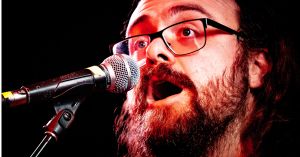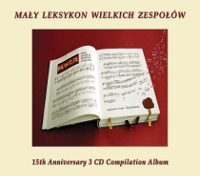Kev Rowalnd: Who, what, when is Tom Slatter?
Tom Slatter: I'm a science fiction singer-songwriter. Or maybe a weird-fiction singer-songwriter. I'd say the latter, but the phrase 'weird fiction' is a bit less well known so sci-fi seems a better bet. A line I used to use was “I'm what you get if early Genesis started writing songs with Nick Cave after watching too many episodes of Doctor Who”.
Occasionally I'm a live act, both acoustic and in the last year or so as a full band. But I do have a full-time job - I work for a social mobility charity in London - that means gigging is pretty hard to do. I just don't have the time, and my main mission over the last few years has been to catch-up with my songwriting and get all my best songs recorded and released. Sunday mornings are a great time for recording, far less conducive to gigging. People don't want to come see you play on a Sunday morning.
I've been accused of being a prog rock artist. I like that, but I'm not sure how useful it is because if you listen to my stuff expecting it to sound like 1970's progressive rock, I think you'll be disappointed. The main influences for me are David Bowie, Radiohead, Mansun, lots of heavy metal bands, various bits of folk, Meat Loaf, the musical Sweeney Todd and my sort-of-classical composition training. I know that might sound an odd mix, but the two main threads are story telling songs and nerdy clever musician stuff like funny chords and time signatures. I always think I'm trying to write music for two people. One of them likes a singalong chorus that tells a story, the other likes clever-clever musician stuff. And the two don't necessarily like the same things, so you have to write things so the one who likes singalong choruses doesn't notice the funny time signatures at the same time as the one who likes the funny time signatures doesn't care they're listening to a singalong rock song. And both of them are me.
Does that all make sense? Possibly not. But it is still true.
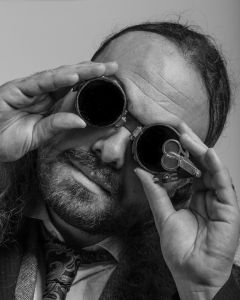 KR:Who originally inspired you musically to pick up an instrument and who inspires you now?
KR:Who originally inspired you musically to pick up an instrument and who inspires you now?
TS: Mine is a musical family. My mum was a music teacher in local schools, including my primary school (though she took ten years out to raise me and my siblings). My dad and brother play guitar, my sister the bassoon. So, there hasn't been a time when I didn't make music. I remember sitting at the piano pre-school age learning the basics. I played violin for a few years in primary school, which I think might have been the tail-end of free individual instrumental lessons in my neck of the woods before they were cut. I then took up guitar at about the age of ten. I also sang in my mum's choir at primary school.
In my teens I got into rock music, heavy metal and 90s grunge. I wanted to be Eddie Vedder, or maybe Thom Yorke, or maybe James Hetfield. I started writing my own songs and started a band with some mates. It was called Nothing Sacred - awful emo stuff. We did one little TV appearance inappropriately on Nickleodeon - I'm not quite sure why they had us on. We were about fifteen and they asked for acts and our bass player sent them a tape cos he thought it would be funny that they heard this dodgy rock band in amongst the wannabe pop stars: but they said yes and we ended up playing on TV while 70’s disco sensation Leo Sayer rocked out on a beanbag. Looking back, it was a bit odd.
I went off to college, then uni, studied music - mostly composition - and played in a songwriting duo called Comrade Robot. Then in 2010 I started releasing music solo, and by my second album - 2012, so about 16 years into songwriting - I started to find my voice and figure out who I really am as a songwriter.
Who inspires me now? Recent artists that I've wanted to steal ideas from include Paul Mosley, Richard Dawson, Matt Blick and there's always David Bowie and King Crimson, obviously.
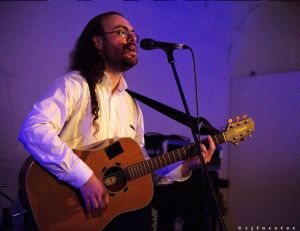 KR:To the uninitiated what is Steampunk, how did you discover it and what fascinates you about the scene?
KR:To the uninitiated what is Steampunk, how did you discover it and what fascinates you about the scene?
TS: Steampunk is not a kind of music. It's a genre of science fiction that takes inspiration from Jules Verne style of science fiction but seen through a retro lens - Verne and HG Wells were writing contemporary sci-fi as it were. The name is a play on cyberpunk, which is Blade Runner style gritty near future sci-fi. The 'punk' bit in both alludes to the American use of the term as in 'you dirty punk' not to punk music directly.
My first few albums told steampunk stories. So, the music itself isn't steampunk - and despite what a lot of silly people on the internet sometimes say there's no such thing as a steampunk style of music - but the lyrics are.
I have an ambivalent attitude to the scene. The people are lovely, the events can be fun, but it isn't a music centred scene. They prefer cabaret style stuff where the audience can get involved, and except on rare occasions I've never really felt my music fits with what the audience wants in a live setting. Prog audiences where people are really into their music and want to listen to every note suit my music much better.
At the very end of ‘Fit the Fourth’, my last album, I looped in a little hint of the opening of my first album ‘Spinning the Compass’ as if to say. “that's finished, the loop is closed, no more steampunk stuff”. All the releases since have not been steampunk at all.
KR: Your first album, ‘Spinning The Compass’ featured just you, and most releases since have been the same. Is it that you don’t like other musicians, or they don’t like working with you?
TS: I can't stand them. Preening, egotistical idiots, all of them. Don't get me started on singers. They're the worst of the lot.
No, not really. Partly it's personality as I'm naturally a bit of a loner. Partly its practicality. I mentioned the lack of time, well, organising people takes a lot of time. If I'm to get the work of recording all these songs recorded, I need to be efficient and that usually means doing things myself. Having said that since ‘Fit the Fourth’ I've had other people collaborating musically on most releases, with ‘Demon’ my latest album as the most collaborative. You can get some great results by just asking good musicians to record what they think fits.
I'm a solo artist for a good reason - I have no interest in compromising on what these songs should sound like. This is my project, my vision, what I want to say with the popular song format. I have no desire to share that with someone else or to work at someone else's pace. I'll have other people play for me, but it'll definitely be me with the final say so.
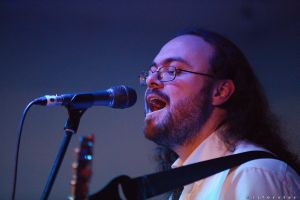 KR: What was Murder and Parliament?
KR: What was Murder and Parliament?
TS: Murder and Parliament is a name I gave to an instrumental project that was a sort of heavy metal-ish, post-rock, weird ambient music. I had a load of music that had originally been written for classical instruments back at uni, but never realised. I decided to rearrange a lot of it for rock band, add a load of drums and make an album of it. It worked pretty well. I like the mix of heavy metal instrumentation and scored out part-writing. There are also some great additions from Alun Vaughan on bass and Chrissie Caulfield on violin.
It isn't finished either. I'm slowly bringing together ideas for Murder and Parliament's second album. I'm not sure when it will be ready, certainly not in the next 9 months, but hopefully before the end of 2020 there'll be another Murder and Parliament album.
KR: Unusually for a “serious” musician, you also release a lot of singles and EP’s. Why is that and where do you see the value?
TS: I take offence at being called a serious musician! Well, not really, but seriousness is too easy, I have no interest in it. I want to be an entertaining musician, a fun musician. I sincerely believe that in art the most difficult thing to do consistently and well is being fun. I want my music to be fun.
Is it unusual to do lots of 'non-album' releases? These days I think the artist that only releases one album every two years is behaving pretty strangely. That's not how the audience listens. Why not pay attention to the audience a bit more? People these days listen to a lot of audio - whole albums and playlists on a commute, hours of podcasts just when mowing the lawn or washing the dishes. And they move on to new stuff quickly. That's where culture is, so why not give people what they want? I've got a tiny group of fans, but they do like my music, so why not give them stuff to listen to.
And besides, I have the ideas and the songs. If I have two songs that fit together but will probably never belong on an album, why not release them digitally? Same with the EPs. I had a load of acoustic murder ballads last year. They weren't long enough to be an album on their own, but there were enough to make an EP, so I did. As I said, I want to get all my good songs recorded. Lots of releases are necessary!
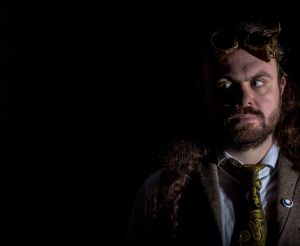 KR: How did you first meet up with the Great Elephant, and was curry involved?
KR: How did you first meet up with the Great Elephant, and was curry involved?
TS: There are two versions of this story, the public one and the real one. I'll ask you please to print the 'public' one, but I'll tell you the real one too. Just whatever you do, don't print the real one.
Here's the public version: David Elephant from Bad Elephant music stumbled across my third album, ‘Three Rows of Teeth’, online. He liked it, played it on his podcast and we got to chatting online. He offered to put out my fourth album ‘Fit the Fourth’, and I said yes. Really easy. David's great to work with.
So that's what you can print. Please don't print what actually happened, which was this: He showed up at my house. Him, in a suit, with trunk and tusks, and these two thugs behind him, one with a Yorkshire accent the other sounding German. They muscled their way into my house, trashed my studio and made it very, very clear that if I didn't do what they said I would be physically hurt. Then they made me sign this contract. It was three hundred pages long, they didn't let me read any of it, and they made me sign it in my own blood.
I'm scared, Kev. Scared. And so is every other BEM artist. Except Simon Godfrey, because he's an idiot.
KR: Have you any desire to work with any other artists on BEM? I have always thought a joint effort with Matt Deacon could produce interesting offspring.
TS: Yeah, in principle. I've co-written and performed on a song with Mike Kershaw and added some guitar to Shineback's last album, but apart from that I haven't done much. I'd be well up for working with Matt Deacon, though I'm a little scared of his obsession with hot sauce. That's kinda weird.
KR: Talk us through Demon, song by song, and what you were trying to achieve in each case.
TS: I have actually recorded a video for each song explaining what they're about. I've done guitar tabs and stuff as well. But they're only for people on my mailing list. The album is autobiographical, just not in the lyrics. Each song alludes in some way to family, or places I've lived.
“Wizards of this Town” is about drunk wizards trying to fix their town through magic. It has odd drunken verses and a big singalong indie rock chorus. Definitely one of my most accessible songs. People really seem to like it. It's inspired by the area I was working in at the time, having just left teaching to move into educational charity.
“Modern World” is the second track. It's the longest track on the album and it's a Frankenstein song - I stitched together disparate parts. There's a 90's indie rock style section, an off-beat prog rock section, and a musique concrete section that one reviewer confusedly said was “just noises”. Which is true, but then, that's all music is! This song is there as a bit of a potted musical biography, and also as a challenge. It says - this album mixes 'normal' rock with a little bit of weird. You better be ready.
“Weather Balloons and Falling Stars” is the third in my tentacle trilogy. It's an upbeat, rocky love song to tentacles. It's also tying into older albums.
“West Wind” is the most prog song on the album. It has folky acoustic guitar, stringsy mellotron sounds and all the time signatures. Well, three of them. It is also a sequel to a song written by the other half of my songwriting duo from years back, Comrade Robot.
The middle section of the album breaks from the rock band set up. We have “Patterns of Light”, a short acoustic song that includes my sister's bassoon and lots of vocal harmonies. Then “Cutting Up All Of Our Dreams”. For this song I sent my mum a score of what I would be singing and asked her to arrange her singers around it. This was the result. The song fades into some scary spoken word stuff courtesy of my brother in law, Joel.
This middle section with a spoken word bit is supposed to be an allusion to the middle of “Ok Computer” by Radiohead and “Six” by Mansun, both of which have a spoken word thing in the middle.
We then go back to the rock band format, with “Drop Dead's Punching Above His Weight Again”, a song about a serial killer. This is a big homage to David Bowie and has great lead guitar from Gareth Cole who has been playing guitar a lot for me in the last two years or so. He's also on last year's EP 'Spirit Box'.
“Tinfoil King” was written very quickly for February Album Writing Month. It uses crossword-clue lyrics to say humanity is rubbish. Some days it's my favourite song on the album.
And finally, “Demon”. “Demon” has been around for a while; Comrade Robot recorded a version. I always wanted to do the big loud rock version, so here it is. It's about various things, including a drunken night out with Pete, the other half of that duo, so the first and last songs have that theme of drunkenness in them. It also has great drumming in the middle where I told Michael Cairns to play an inappropriate, slightly sloppy jazz solo. He obliged. It's great.
That last song is a reminder of my early twenties, being slightly glum and unsure about what to do with life.
And that's the album. I'm dead proud of it.
KR: So what’s next for Tom Slatter, and where can we hear more of your music?
TS: Where you can hear more is easy - www.tomslatter.co.uk
As to what's next - I have literally no idea. In the short term I'm focusing on telling people about ‘Demon’ and doing some online gigs because that's a bit more practical than touring for me at the moment.
Beyond that, this is pretty uncharted territory. For the first time in at least a decade I don't have any songs 'in the bank' that I definitely want to record. There's maybe one piece of unfinished business - an ep I released a few years ago that i don't think was recorded well enough, that I might redo - and then I've got no more ideas.
That means I need to go back to the drawing board and figure out what the next version of me sounds like. Which is kind of exciting. I've no idea what I'll write next.


